With Facebook’s constantly changing algorithm, it becomes increasingly difficult for your hotel’s content to reach the amount of users it once did. Facebook’s most recent algorithm update came about in order to keep users happy by making sure their news feeds displayed relevant content posted by family and friends instead of overwhelming them with branded content. This shift not only caused marketers to get more strategic with their organic efforts, but also encouraged more businesses to invest in paid campaigns to reach more Facebook users.
According to Facebook, “More than 1.4 billion people use Facebook to connect with what matters to them, and more than 900 million visit every day.” With so many people actively using Facebook each day, it is important to understand how your hotel can utilize ads to enhance your Page’s performance.
Facebook Ad Type
Your ad type will depend on your hotel’s goals. While Facebook offers many unique options, the primary ads your hotel will launch include: Page promotion (to gain more Page likes), post promotion (increase post engagement), and website clicks campaigns (send users directly to your website).
Page Like Ads
If your goal is to reach 2,000 Page likes on Facebook, you will want to run a Page promotion or brand awareness campaign to encourage users to “like” your Page. Below is an example of an ad from a Page promotion campaign. The ad includes a single image, a small amount of copy, and a call-to-action button encouraging users to “like” the Page.
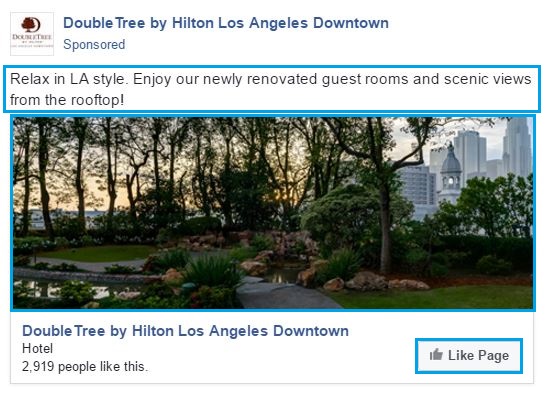
Post Engagement
Post promotion ads are beneficial when your hotel wants more interaction or impressions on a specific post. If you want to boost awareness about an upcoming event on property, a promoted post will reach more users than an organic post about the event. One benefit of running a promoted post campaign over a Page promotion or website clicks campaign is that you are not limited to the amount of text you can use. Below is an example of a post engagement campaign which includes the original image and text from the organic post in addition to a call-to-action “like” button at the top of the ad.
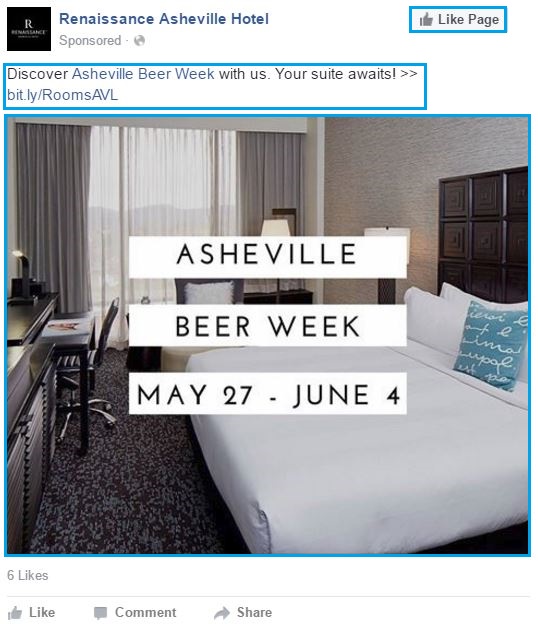
Website Clicks Ad
A website clicks campaign is useful when you want to increase traffic to your website. These campaigns come in handy when you want to promote an upcoming special. Instead of having guests prompted to “like” your Page, you are able to change to call-to-action to state, “Book Now.” When clicked, users are led directly to the special offer on your website. Below is an example of a website clicks ad for a hotel wanting to promote a special deal. You can see the image size is slightly different than a Page promotion campaign and there is additional space for copy to explain the package details.
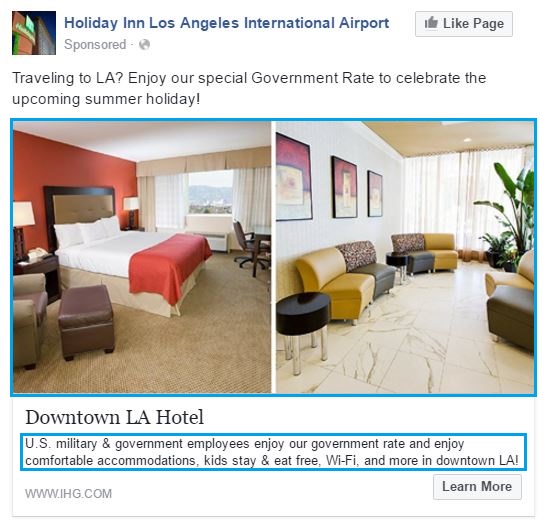
Advanced Targeting
One of the greatest advantages of running paid Facebook campaigns is the ability to target niche groups and individuals interested in your hotel. According to a Nielsen OCR study, “compared to the average online reach of 38% for narrowly targeted campaigns, Facebook is 89% accurate.”
Facebook allows you to target your audience by location, demographics (age, gender, and language), interests, and behaviors. Before creating your audience, it is crucial to have a strategy in place. Having a specific strategy will ultimately deliver your ad to the intended audience. For example, if you are interested in increasing awareness about your newly renovated meeting spaces, you would tailor your targeting strategy and messaging to business-friendly groups instead of families and leisure travelers.
Audience
Facebook qualifies a user’s location by what is stated on their timeline and then verifies the information by their IP address. Choosing your target locations is crucial to the overall effectiveness of your ad. If you want to highlight a Mother’s Day brunch hosted at the hotel, you would want to target people living in the surrounding area instead of targeting the entire United States because it is unlikely that someone would travel across the country for brunch. If your hotel has an independent website, you could use Google Analytics data to see where your website traffic is coming from and target those specific locations. Below is an image of an ad targeted to reach Los Angeles, San Francisco, and Sacramento.
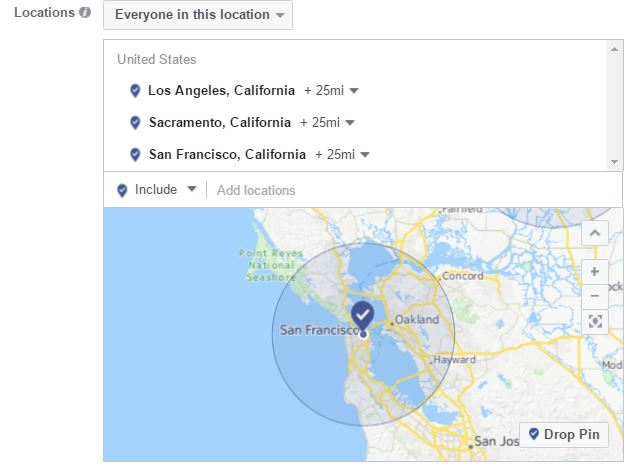
Demographics
Choosing demographics to further narrow down your audience is important because you want your ads to reach a specific group of people. If the majority of your targeted audience is Spanish speaking, it is crucial to include language in your demographic targeting. Facebook does have standards in regards to demographics, one being that if you are targeting wineries, breweries, or anything relating to alcohol, you must choose 21+ for the age range. Below is an image of an ad targeting Spanish and English speaking individuals and users between the ages of 18 and 50 years old.

Interests
Facebook identifies interests from “information they’ve added to their Timeline, keywords associated with the Pages they like or apps they use, ads they’ve clicked on and other similar sources.” If you want to target guests traveling into town for a specific convention, you are able to target the convention name and keywords associated with the conference. Facebook also gives you the option to target by education, relationship, work, financial, home, parents, generation, politics, life events, and more. Below is an example of an ad targeting a combination of interests, demographics, and behaviors.
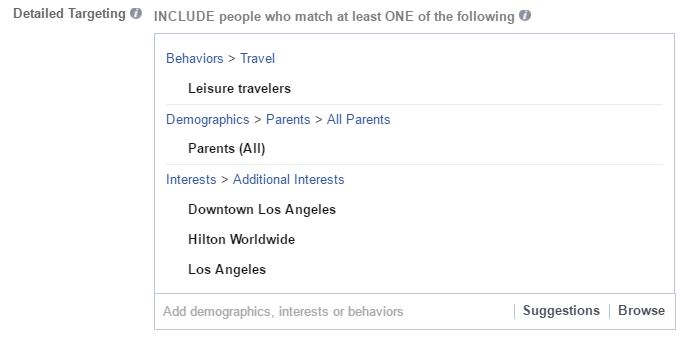
Behaviors
Facebook defines behaviors as, “activities that people do on or off Facebook that inform on which device they’re using, purchase behaviors or intents, travel preferences and more.” This is beneficial if you are targeting business travelers; you will want to select categories like, “frequent flyers” or “traveled in the past month”.
After you have created your audience, view the audienced reach meter to ensure your selections as a whole are not too broad or too specific. Ideally, you want the pin to stay in the green and your potential audience to reach more than 10,000 individuals. Below is an image showing a recap of the targeted audience, the audience meter, and the campaign’s potential reach.
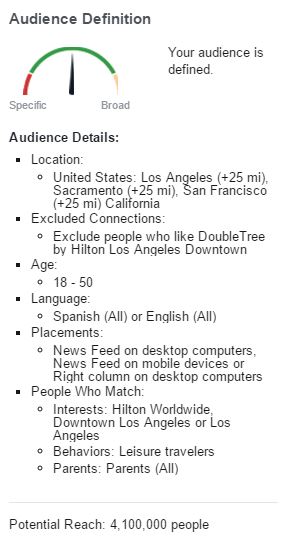
A/B Testing Capabilities
As a digital marketer, there is no golden rule or path outlined to gain 1,000 followers from a $25 dollar Facebook campaign. You have to test images and messaging to see what works and resonates with users. Using Facebook’s A/B testing capabilities allows marketers to design and target ads to discover the most effective combinations. Throughout the duration of the campaign, you are able to turn off under-performing ads for better campaign results. At Blue Magnet, the social media department typically tests two images and two messages for a total of four ads. Below is an example of four different ads in one ad set for a hotel’s Page promotion campaign.


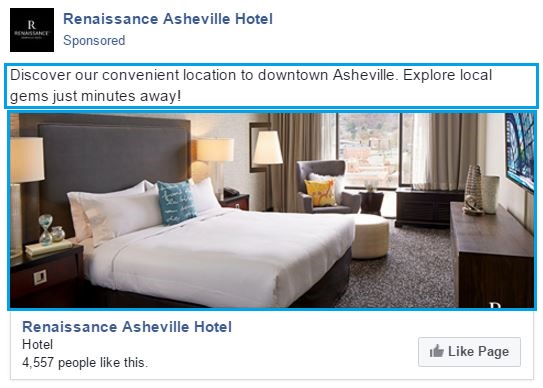
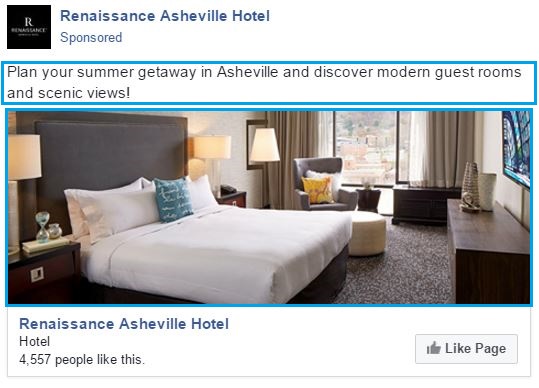
Facebook Insights
Before running your campaign, it is crucial to know who your Facebook audience is. Facebook Insights allows you to understand how people are engaging with your Page, learn more about post engagements, explore Page performance metrics, and more. Like advanced targeting, Facebook delivers a lot of information including demographics, location, interest, and behaviors of your hotel’s fans. By gathering this information, you are able to target a specific audience for your next Facebook ad campaign. For an in-depth analysis of this tool refer to, “How to Use Facebook Audience Insights to Identify and Reach New Guests” by my fellow BMI-er, Steven Williams.
Creative Control
After you have determined the target audience for your campaign, you must establish the creative elements. Depending on the ad type, your hotel’s creative will include an image, body text, and a headline. Your image and messaging should compliment one another and be relevant to your intended audience. If you targeted leisure travelers, your messaging and images should speak to those looking to plan a vacation.
Beneficial or Not?
While running Facebook ads may not dominant your overall marketing plan, they are certainly beneficial for any hotelier looking to showcase their hotel on social media. With Facebook ads you are able to increase brand awareness through advanced targeting while having creative control. Facebook ads also allow you to reach potential guests that you wouldn’t through other marketing verticals.
Now that you understand how to use Facebook ads for your hotel, begin strategizing with your digital marketing manager or learn more about Blue Magnet’s social media services.




